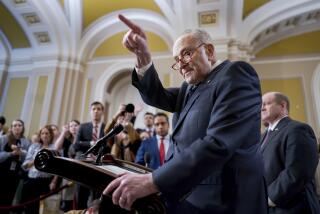Senate Democrats block Obama-backed trade measure
In a stinging rebuke of President Obama by his own party, Senate Democrats on Tuesday blocked a White House-backed measure that would give the president the authority he says he needs to finalize a 12-nation Pacific trade pact.
Worried that a deal would lead to a loss of American jobs, Democrats rebuffed aggressive White House lobbying efforts and held out for greater assurances that workers would be protected and trade partners would operate according to the rules.
Though the measure is supported by the Republican-controlled Senate, Tuesday’s 52-45 vote fell short of the 60 votes needed to avoid a Democratic filibuster.
The Obama administration has made the emerging 12-nation Trans-Pacific Partnership trade pact a top priority of his final term, finding a ready partnership with Republican leaders who now have the majority in both chambers of Congress.
The vote was a major, if temporary, setback for the administration. Senate Republicans are likely to try again in the coming days.
Both Obama and Republican leaders say the Trans-Pacific Partnership will bolster the U.S. economy and ensure a larger market for U.S. exports.
“This is not a game. This is about trying to pass something important to the country – that happens to be a priority of the president,” said a clearly frustrated Senate Majority Leader Mitch McConnell (R-Ky.), who vowed to try again to advance the bill, likely in a matter of days. “Hopefully at some point they’ll come to their senses.”
Democrats, though, are holding out for guarantees that there will also be new rules to clamp down on currency manipulators and that workers who lose their jobs due to the trade deal will be eligible for employment retraining assistance.
“If there’s one unifying principal about the economics of today it is this: The middle class is having a hard time in America today -- perhaps the worst time in modern history,” said Sen. Barbara Boxer (D-Calif.), who has voted for trade bills in the past, but has concerns about the current measure. “Our middle class is being hollowed out.”
The Senate was expected to provide a more welcoming venue than the House for the fast-track bill. Similar legislation has been approved ahead of previous trade deals, and this one simply assures that the final trade pact will receive a vote in Congress without amendments.
But the political dynamics of both parties have shifted since past trade deals were approved, and the nation’s sluggish economy has only amplified concerns over the contents of the deal.
Some Republicans have grown skeptical of big corporations, and hew to an economic populism that aligns them with liberal Democrats like Sen. Elizabeth Warren of Massachusetts. Many conservative Republicans are wary of giving a president they oppose fast-track authority.
Democrats want to provide more money for worker retraining than Republicans have offered. And they are pushing for rules to prevent countries from manipulating currency exchange rates to gain an edge in trade. China has frequently been targeted by lawmakers as a culprit, but more recently Japan, the second biggest economy in the Trans-Pacific Partnership negotiations, also has come under fire as the yen has fallen in value against the dollar.
Many Democrats argue that intentionally weakened currencies have widened a trade imbalance that can be seen, for example, in the auto industry, where thousands of Japanese cars are imported for every single American-made vehicle that is shipped overseas. But the White House is concerned that new currency rules could hit the U.S., too, if other countries criticize Federal Reserve monetary policies that could, as a byproduct, weaken the dollar.
For the latest from Congress, follow @LisaMascaro
More to Read
Get the L.A. Times Politics newsletter
Deeply reported insights into legislation, politics and policy from Sacramento, Washington and beyond. In your inbox three times per week.
You may occasionally receive promotional content from the Los Angeles Times.







